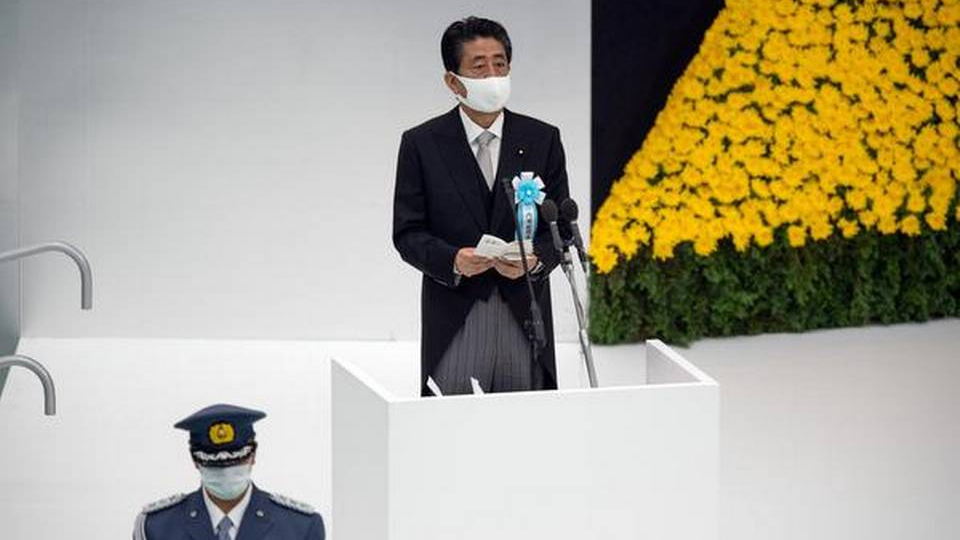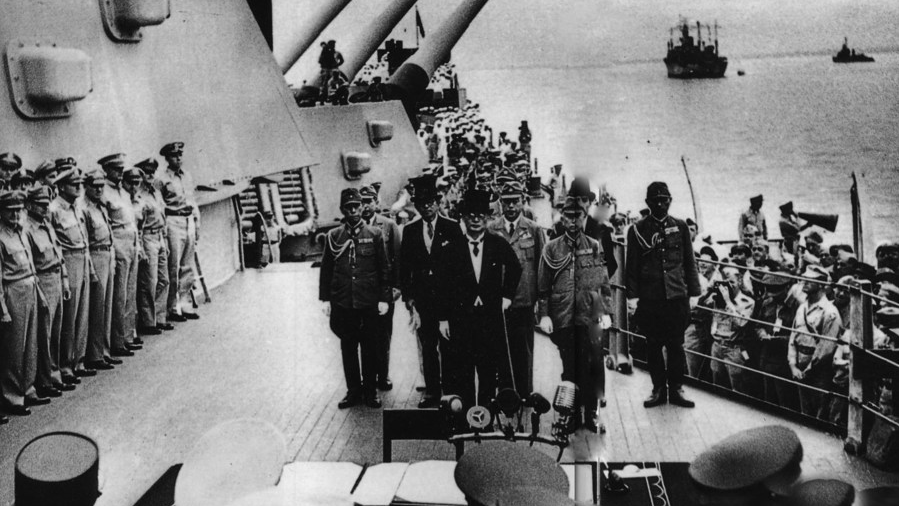
Japanese Prime Minister Shinzo Abe makes a speech during a memorial service marking the 75th anniversary of Japan's surrender in World War II at the Nippon Budokan hall in Tokyo, Japan, August 15, 2020. /Reuters
Japanese Prime Minister Shinzo Abe makes a speech during a memorial service marking the 75th anniversary of Japan's surrender in World War II at the Nippon Budokan hall in Tokyo, Japan, August 15, 2020. /Reuters
Editor's note: Iram Khan is a Pakistan-based commentator on international affairs. The article reflects the author's opinions and not necessarily the views of CGTN.
When nuclear bombs obliterated two Japanese cities in World War II, they caused unimaginable suffering. The unprecedented scale of destruction forced Japan to finally surrender and call off its own reign of terror it had unleashed in the areas it had occupied.
This is by no means an exculpation of the use of nuclear weapons against Japan. Instead, this is a call for Japan to keep the memory of its pre-World War atrocities fresh when it remembers the horrors of the nuclear attack.
The legacy of Japanese commanders like Yasuhiko Asaka and Tomoyuki Yamashita, who brought large-scale miseries to their Asian neighbors, is still a cause of agony for those who survived and those whose dear ones perished.
China, too, remembers the infamous Nanjing massacre at the hands of Japanese invaders that resulted in the death of more than 300,000 people. The six-week rampage is a painful reminder of the horrific role Japan played until its surrender exactly 75 years ago on August 15, 1945.
Reflecting upon the excesses of the Kwantung Army, Japan must remember for generations to come that before it became a victim, it was a victimizer.
But it is unfortunate to see that the administration of Prime Minister Shinzo Abe is not too forthcoming in denouncing that part of Japan's history. Former Japanese Emperor Akihito and his predecessor Emperor Naruhito both have expressed "deep remorse" over their country's wartime actions, but Abe's unwillingness to do so raises concerns.
It is important that Japan realizes its past mistakes and pledges not to repeat them. A continued retrospect is necessary for Japan's leaders and its military because denial can quite possibly push their country close to that abhorrent behavior.
In July, when Abe criticized the recently promulgated National Security Law for China's Hong Kong Special Administrative Region in June, it was tantamount to yet another act of meddling in its neighbors' internal affairs.
Likewise, Japan is also flirting with the idea of joining the U.S.-led Five Eyes intelligence alliance that has set its eyes on checking China's peaceful rise on the global stage.
As we have seen in post-World War II, the U.S. strategic alliances before the war have shifted abruptly, leaving many of its partners skeptical of any commitments it makes.

Japan's surrender ceremony aboard the United States Navy battleship USS Missouri anchored in Tokyo Bay, September 2, 1945. /Xinhua
Japan's surrender ceremony aboard the United States Navy battleship USS Missouri anchored in Tokyo Bay, September 2, 1945. /Xinhua
The fanfare that continued around NATO during the Cold War is in tatters. U.S. President Donald Trump criticizes the past administrations' long-trusted allies for not doing enough and not spending enough on the military alliance.
How long his administration's infatuation with expanding the Five Eyes network will last can only be a matter of speculation. Any change in East Asia's geopolitical situation can leave Japan and other countries high and dry without any notice.
Unlike the pre-World War II days, Japan is not the only influential power of the region now. With its rising economy, China is a major player, with globally integrated supply chains fueling the growth of its friends and those who perceive it as a rival.
It is, therefore, pertinent for Japan to strengthen its regional relations, especially with China. It should make the best use of China's growing economic clout and take advantage of the goodwill China enjoys among participating countries in the Belt and Road Initiative (BRI). One opportunity can be launching tripartite projects, where China and Japan join hands in a third country and expand each other's economic outreach.
The U.S. is continuing to militarize the region, and Japan seems to be playing along. Since Japan has seen the worst ever face of war, it should value peace more than anyone else.
For the last 75 years, China and Japan have avoided military confrontations and successfully built their economies from scratch. However, the U.S. has overstretched its military engagements to a level where its commitment to the welfare of its citizens has been drastically eroded.
The way forward for China and Japan, as suggested by Chinese Foreign Minister Wang Yi, is to strengthen communication and cooperation in international and regional affairs. Both believe in multilateralism and free trade. And with the rising unilateralism from a third nation, they should join hands for economic growth and strive not to let the pre-World War II history repeat itself.
(If you want to contribute and have specific expertise, please contact us at opinions@cgtn.com.)